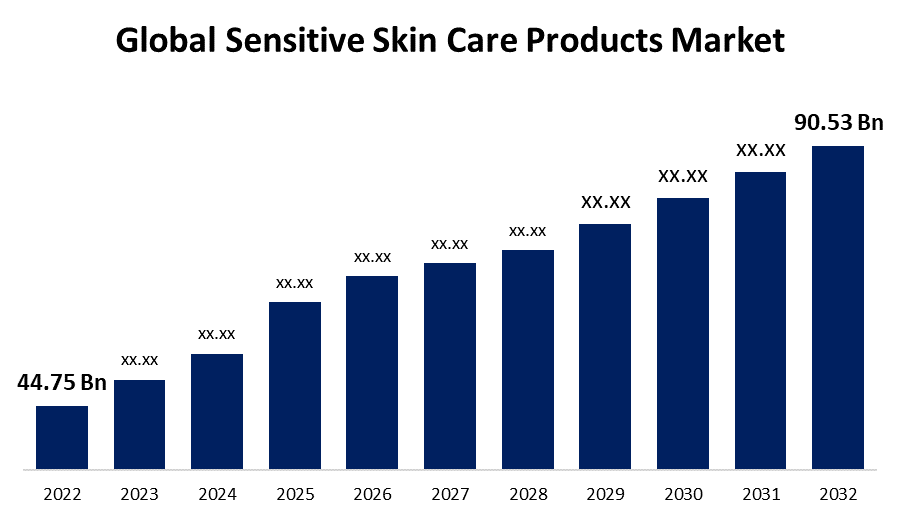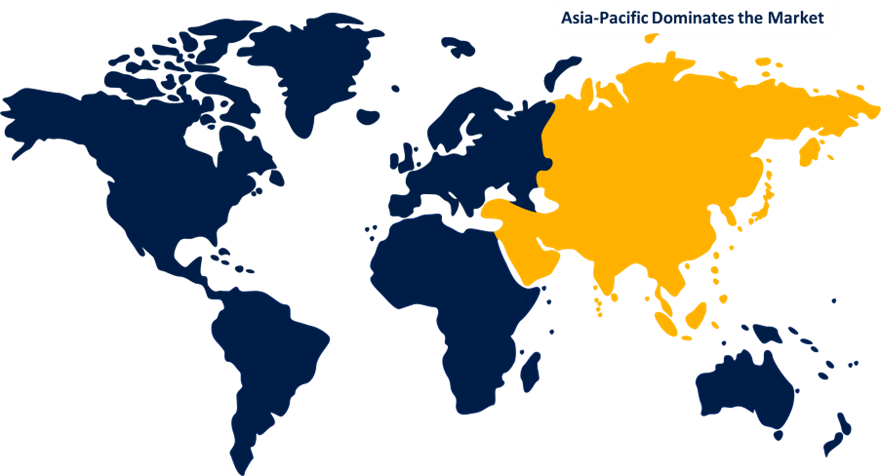Global Sensitive Skin Care Products Market Size, Share, and COVID-19 Impact Analysis, By Product Type (Face Care, Body Care, and Lip Care), By Gender (Male and Female), By Distribution Channel (Supermarkets & Hypermarkets, Specialty Stores, Pharmacy & Drugstores, Online, and Others), By Region (North America, Europe, Asia-Pacific, Latin America, Middle East, and Africa), Analysis and Forecast 2022 – 2032
Industry: Consumer GoodsGlobal Sensitive Skin Care Products Market Insights Forecasts to 2032
- The Global Sensitive Skin Care Products Market Size was valued at USD 44.75 Billion in 2022.
- The Market is growing at a CAGR of 7.3% from 2023 to 2032
- The Worldwide Sensitive Skin Care Products market Size is expected to reach USD 90.53 Billion by 2032
- North America is expected to grow higher during the forecast period

Get more details on this report -
The Global Sensitive Skin Care Products Market Size is expected to reach USD 90.53 Billion by 2032, at a CAGR of 7.3% during the forecast period 2023 to 2032.
Market Overview
Sensitive skin care products are specifically formulated to cater to the unique needs of individuals with delicate or reactive skin. These products are designed to minimize the risk of irritation, redness, and discomfort often experienced by sensitive skin types. They typically contain gentle ingredients that are less likely to trigger adverse reactions, such as fragrances, dyes, and harsh chemicals. Sensitive skin care products encompass a wide range of products, including cleansers, moisturizers, sunscreens, and makeup. They often feature soothing and calming ingredients like aloe vera, chamomile, and oatmeal, which help to reduce inflammation and provide relief. These products undergo rigorous testing to ensure they are hypoallergenic and non-comedogenic, making them suitable for sensitive skin. By using sensitive skin care products, individuals can maintain a healthy and balanced skincare routine without compromising the integrity of their skin.
Report Coverage
This research report categorizes the market for sensitive skin care products market based on various segments and regions and forecasts revenue growth and analyzes trends in each submarket. The report analyses the key growth drivers, opportunities, and challenges influencing the sensitive skin care products market. Recent market developments and competitive strategies such as expansion, product launch, and development, partnership, merger, and acquisition have been included to draw the competitive landscape in the market. The report strategically identifies and profiles the key market players and analyses their core competencies in each sub-segments of the sensitive skin care products market.
Global Sensitive Skin Care Products Market Report Coverage
| Report Coverage | Details |
|---|---|
| Base Year: | 2022 |
| Market Size in 2022: | USD 44.75 Billion |
| Forecast Period: | 2022-2032 |
| Forecast Period CAGR 2022-2032 : | 7.3% |
| 2032 Value Projection: | USD 90.53 Billion |
| Historical Data for: | 2018-2021 |
| No. of Pages: | 200 |
| Tables, Charts & Figures: | 130 |
| Segments covered: | By Product Type, By Gender, By Distribution Channel, By Region and COVID-19 Impact Analysis. |
| Companies covered:: | L'Oreal S.A., Unilever PLC, The Estee Lauder Companies Inc., Procter & Gamble Company, Maxingvest AG, Amorepacific Corporation, Pevonia International Inc., Johnson & Johnson Services Inc., Kao Corporation, and Sebapharma GmbH & Co. KG and other key venders. |
| Pitfalls & Challenges: | COVID-19 Empact, Challenge, Future, Growth, & Analysis |
Get more details on this report -
Driving Factors
The sensitive skin care products market is driven by several factors because the growing prevalence of skin sensitivities and allergies among individuals is a significant driver. Increasing environmental pollution, exposure to harsh chemicals, and changing lifestyles contribute to the rise in sensitive skin conditions, creating a demand for specialized products. Rising consumer awareness about the importance of skincare and the availability of a wide range of sensitive skin care products contribute to market growth. Additionally, advancements in research and development, leading to the formulation of innovative and effective products, fuel market expansion. Furthermore, the influence of social media, beauty bloggers, and celebrity endorsements amplifies the demand for sensitive skin care products. Overall, the expanding global population, particularly in emerging economies, presents a vast consumer base for market players to cater to, driving the overall growth of the sensitive skin care products market.
Restraining Factors
The sensitive skin care products market faces certain restraints that impact its growth, the higher cost of specialized formulations and ingredients can limit the affordability and accessibility of these products for some consumers. Additionally, the lack of stringent regulations and standardized definitions for sensitive skin can create confusion among consumers, hindering their decision-making process. Furthermore, the availability of counterfeit or low-quality products in the market can erode consumer trust and lead to skepticism. Moreover, the presence of alternative skincare solutions, such as natural remedies or DIY products, can pose competition to the sensitive skin care products market. Overall, the limited distribution channels and reach in certain regions can impede market expansion, particularly in rural areas or underdeveloped economies.
Market Segmentation
- In 2022, the face care segment accounted for around 52.5% market share
On the basis of the product type, the global sensitive skin care products market is segmented into face care, body care, and lip care. The face care segment dominates the market share in the sensitive skin care products market for several reasons, the face is the most exposed part of the skin and is therefore more susceptible to environmental factors and irritants, making it more prone to sensitivity and reactions. As a result, individuals with sensitive skin often prioritize specialized care for their facial skin. The face care segment encompasses a wide range of products specifically designed for sensitive skin, such as cleansers, moisturizers, serums, masks, and sunscreens. These products are formulated with gentle and soothing ingredients to minimize the risk of irritation and provide targeted care for facial skin. Additionally, the face care segment is driven by the increasing demand for anti-aging solutions, as individuals with sensitive skin are also concerned about premature aging and the appearance of fine lines and wrinkles. Thus, the face care segment dominates the sensitive skin care products market due to its focus on addressing the unique needs and concerns of sensitive facial skin.
- In 2022, the supermarkets & hypermarkets segment dominated with more than 37.1% market share
Based on the type of distribution channel, the global sensitive skin care products market is segmented into supermarkets & hypermarkets, specialty stores, pharmacy & drugstores, online, and others. The supermarkets and hypermarkets segment dominates the sensitive skin care products market for several reasons, these retail channels offer convenience and a wide range of product options under one roof, making them preferred destinations for consumers. Customers can easily compare different brands and product variations, allowing them to make informed purchasing decisions. The supermarkets and hypermarkets have extensive shelf space, enabling them to stock a diverse selection of sensitive skin care products from various brands. This availability and variety attract a large customer base. Additionally, these retail formats often offer promotional deals and discounts, making sensitive skin care products more accessible and affordable. Moreover, supermarkets and hypermarkets have a strong distribution network and reach, making it easier for manufacturers and suppliers to distribute their products to a broader consumer base. Hence, the supermarkets and hypermarkets segment dominates the sensitive skin care products market due to its convenience, product range, and widespread presence.
Regional Segment Analysis of the Sensitive Skin Care Products Market
- North America (U.S., Canada, Mexico)
- Europe (Germany, France, U.K., Italy, Spain, Rest of Europe)
- Asia-Pacific (China, Japan, India, Rest of APAC)
- South America (Brazil and the Rest of South America)
- The Middle East and Africa (UAE, South Africa, Rest of MEA)
Asia-Pacific dominated the market with more than 39.5% revenue share in 2022.

Get more details on this report -
Based on region, Asia-Pacific dominates the sensitive skin care products market due to several key factors, the region has a large population, including a significant number of individuals with sensitive skin conditions. This creates a substantial consumer base for sensitive skin care products. The rising disposable income and improving living standards in countries like China, India, and Japan have contributed to increased consumer spending on skincare products, including those specifically formulated for sensitive skin. Additionally, the growing influence of social media and beauty trends in the region has fueled the demand for specialized skincare products. Furthermore, the presence of established and emerging local brands offering innovative and affordable sensitive skin care products has further boosted market growth. Moreover, the expanding e-commerce industry has made these products easily accessible to consumers, driving their popularity and market dominance in the Asia-Pacific region.
Recent Developments
In February 2022, Beiersdorf introduced the NIVEA MEN SENSITIVE PRO Minimalist series, aligning with the prevailing minimalist trend. The product range comprises three items, including a facial and beard gel cleanser, a shaving cream, and a moisturizing cream.
In April 2021, Neutrogena announced its new Neutrogena Bright Boost collection for Indian consumers in order to address the growing issue of skin dullness.
Competitive Analysis:
The report offers the appropriate analysis of the key organizations/companies involved within the global sensitive skin care products market along with a comparative evaluation primarily based on their product offering, business overviews, geographic presence, enterprise strategies, segment market share, and SWOT analysis. The report also provides an elaborative analysis focusing on the current news and developments of the companies, which includes product development, innovations, joint ventures, partnerships, mergers & acquisitions, strategic alliances, and others. This allows for the evaluation of the overall competition within the market.
List of Companies:
- L'Oreal S.A.
- Unilever PLC
- The Estee Lauder Companies Inc.
- Procter & Gamble Company
- Maxingvest AG
- Amorepacific Corporation
- Pevonia International Inc.
- Johnson & Johnson Services Inc.
- Kao Corporation
- Sebapharma GmbH & Co. KG
Key Target Audience
- Market Players
- Investors
- End-Users
- Government Authorities
- Consulting and Research Firm
- Venture Capitalists
- Value-Added Resellers (VARs)
Market Segment
This study forecasts revenue at global, regional, and country levels from 2019 to 2032. Spherical Insights has segmented the global sensitive skin care products market based on the below-mentioned segments:
Sensitive Skin Care Products Market, By Product Type
- Face Care
- Body Care
- Lip Care
Sensitive Skin Care Products Market, By Gender
- Male
- Female
Sensitive Skin Care Products Market, By Distribution Channel
- Supermarkets & Hypermarkets
- Specialty Stores
- Pharmacy & Drugstores
- Online
- Others
Sensitive Skin Care Products Market, Regional Analysis
- North America
- US
- Canada
- Mexico
- Europe
- Germany
- UK
- France
- Italy
- Spain
- Russia
- Rest of Europe
- Asia Pacific
- China
- Japan
- India
- South Korea
- Australia
- Rest of Asia Pacific
- South America
- Brazil
- Argentina
- Rest of South America
- Middle East & Africa
- UAE
- Saudi Arabia
- Qatar
- South Africa
- Rest of Middle East & Africa
Need help to buy this report?